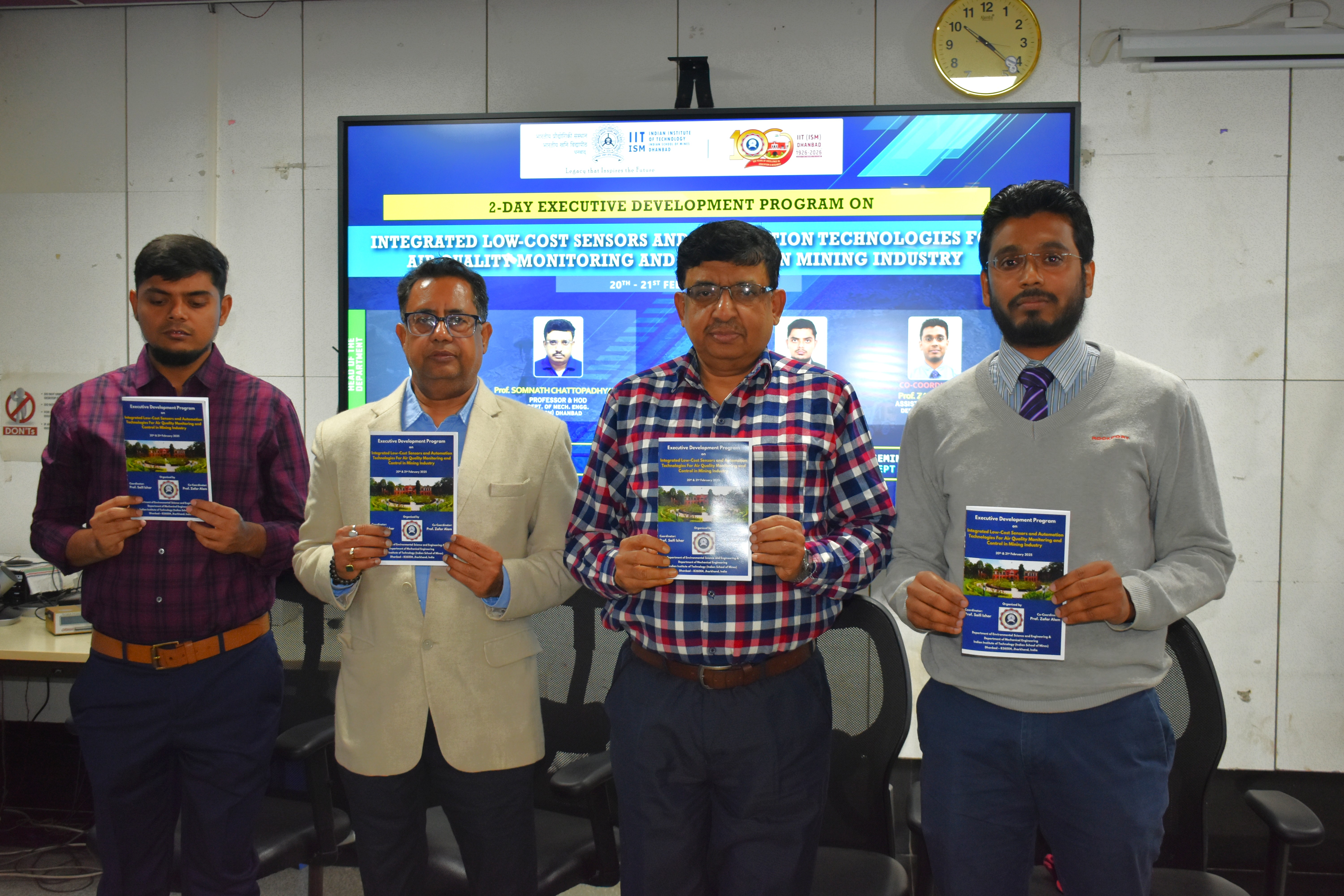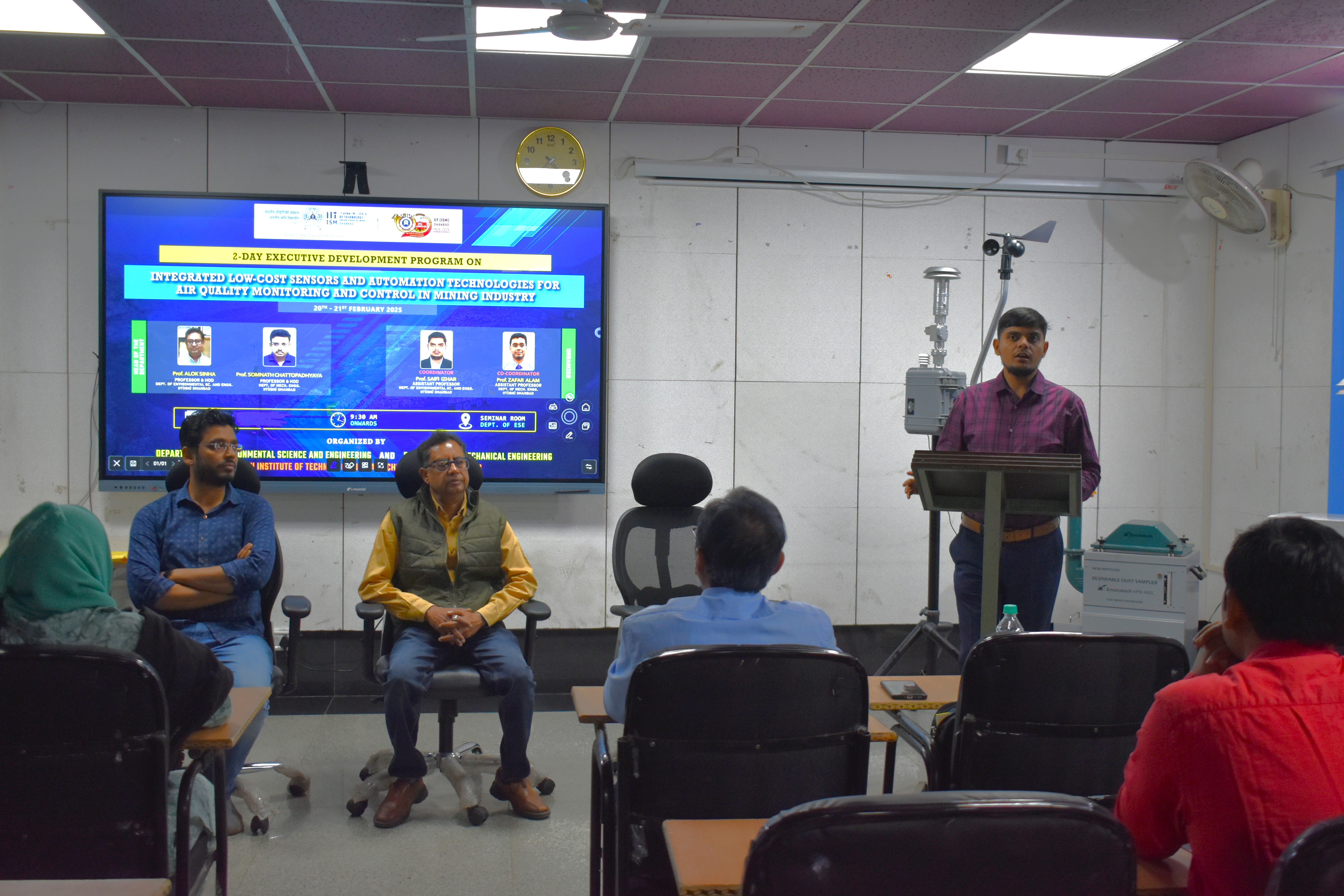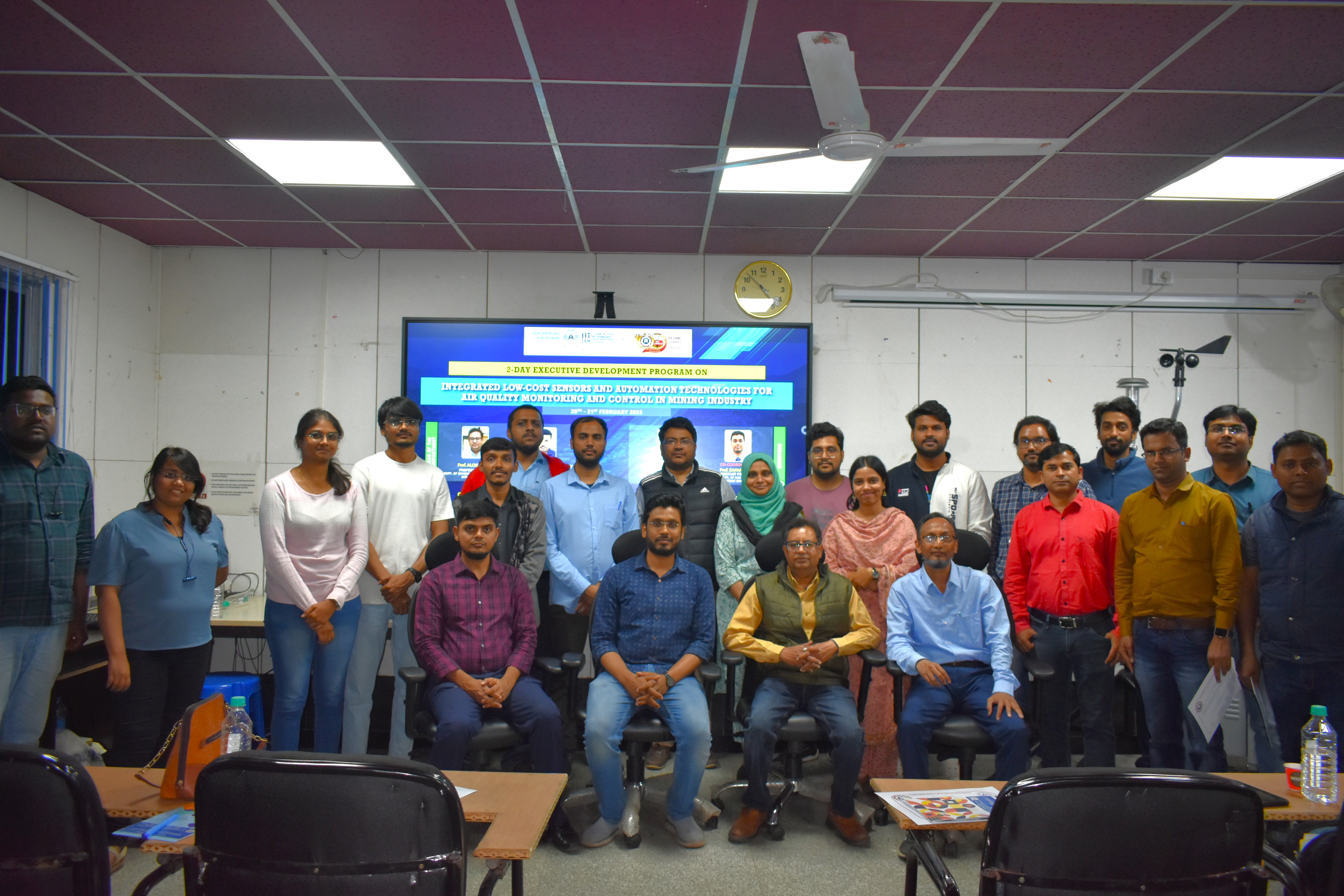Date | 20.02.2025:

(L to R): Prof. Saifi Izhar - Assistant Professor, Department of Environmental Science and Engineering & Program Coordinator, Prof. Alok Sinha - HOD, Department of Environmental Science and Engineering, Prof Somnath Chattopadhyaya - HOD, Dept. of Mechanical Engineering, and Prof. Zafar Alam, Assistant Professor, Department of Mechanical Engineering & Program Co-coordinator.
As part of the ongoing centenary celebrations of IIT (ISM) Dhanbad, the Department of Environmental Science and Engineering, in collaboration with the Department of Mechanical Engineering, organized the inaugural session of the 2-day Executive Development Programme on “Integrated Low-Cost Sensors and Automation Technologies for Air Quality Monitoring and Control in the Mining Industry” on 20.02.2025.
Along with Prof. Saifi Izhar, Assistant Professor, Department of Environmental Science and Engineering, the Program Coordinator, and Prof. Zafar Alam, Assistant Professor, Department of Mechanical Engineering, the Co-coordinator of the program, the event was graced by Prof. Alok Sinha, HOD, Department of ESE and Prof Somnath Chattopadhyaya, HOD, Dept. of Mechanical Engineering, present in the dais during the inaugural ceremony.
At the onset of the program, Prof. Saifi Izhar welcomed all the dignitaries and participants and gave a brief introduction about the 2-Day Executive Development Programme. Prof. Saifi said that the emergence of low-cost sensor (LCS) technologies for air quality monitoring is gaining attention in developed countries due to their affordability and real-time cloud-based data visualization. However, industrial automation has not yet achieved widespread success due to the need for interdisciplinary expertise and high initial costs. With the increasing availability of automated systems, industries require skilled professionals to manage them. Addressing this gap, academic contributions from cross-disciplinary experts and technology integrators are becoming crucial. This course is designed as an introductory-level program for engineers and researchers, combining theoretical lectures with hands-on lab exercises to provide exposure to air quality sensors, robotics, and automation, enabling participants to pursue careers in these fields.
Following Prof. Saifi’s welcome address, Prof. Alok Sinha, Head of the Department of Environmental Science and Engineering, addressed the participants, providing a brief introduction to the department. He emphasized the importance of interdisciplinary collaboration between Environmental Science and Engineering and Mechanical Engineering in addressing critical challenges like air pollution. He commended the initiative taken by faculty experts from both domains to bridge the gap between technological advancements and environmental sustainability. Prof. Sinha said that air quality monitoring stations are available that continuously measure and provide data. However, Prof. Sinha stressed the urgent need to translate this data into immediate action rather than prolonged assessments. Citing an example, Prof. Sinha explained that if sensors in a mining area detect rising PM10 or PM2.5 levels, authorities should promptly respond by implementing mitigation measures such as water sprinkling, dust suppression techniques, or controlling vehicular emissions. This proactive approach can significantly reduce pollution impacts in real-time. Prof. Sinha urged participants to leverage technological innovations and research-driven approaches to develop effective, practical, and timely solutions for air quality management. Concluding his address, Prof. Sinha wished all participants great success and a valuable learning experience in this two-day Executive Development Program.
Following Prof. Alok Sinha’s address, Prof. Somnath Chattopadhyaya, Head of the Department of Mechanical Engineering, delivered his speech, emphasizing the critical impact of air pollution on public health. Citing data from the renowned journal LANCET, he highlighted the alarming statistic that long-term exposure to air pollution contributes to 1.5 million deaths annually in India. He pointed out that this crisis persists largely due to a lack of awareness and proactive action. Prof. Chattopadhyaya stressed the importance of a structured approach to tackling air pollution. From a manufacturing perspective, he explained that before developing air quality monitoring devices and equipment, it is essential to first assess the situation, understand the crisis, and then implement corrective measures. He underscored the need for such technologies to be affordable and cost-effective, ensuring their large-scale implementation in a budget-conscious developing country like India. Expressing his gratitude to the faculty experts from both Environmental Science and Engineering and Mechanical Engineering for their collaboration in organizing this Executive Development Program, he suggested that similar initiatives be integrated into the academic curriculum. He proposed incorporating such projects into the B.Tech. program, enabling students to gain hands-on experience in fabricating low-cost sensors. He envisioned deploying these sensors across the campus buildings to display real-time air quality data, encouraging proactive measures such as reducing fossil fuel usage, promoting walking, and adopting sustainable practices. He emphasized that such initiatives could set the foundation for IIT (ISM) Dhanbad to become the nation’s first Green IIT campus. Prof. Chattopadhyaya also highlighted the unique value of hands-on training, noting that while high-quality lectures are readily available on platforms like YouTube, true in-depth learning comes from practical experience in a laboratory environment. Prof. Chattopadhyaya concluded his address with two thought-provoking quotes—one from MP Dr. Shashi Tharoor: “Whatever we can retain after an examination is education,” and another from Swami Vivekananda: “Expansion is life, and contraction is death.” He expressed his hope that this program, though a small beginning, would create an exponential cascading effect, inspiring participants to share their knowledge and promote sustainability on a broader scale.
Following Prof. Somnath Chattopadhyaya’s address, Prof. Zafar Alam, Assistant Professor in the Department of Mechanical Engineering and Co-coordinator of the program, delivered the concluding remarks. Summarizing the key messages from the addresses, Prof. Alam stressed the importance of adopting and even developing low-cost sensors. He highlighted that merely monitoring air quality with sensors is insufficient—comparing it to “half-cooked food” or “a storybook half-written.” Data collection alone is not enough; actionable steps must follow. Moreover, these corrective measures should be automated to create a comprehensive and effective solution that can be seamlessly integrated into industrial processes. Illustrating his point, Prof. Alam gave an example of traditional plant watering habits—where people water plants regardless of whether they need it or not. Similarly, in mining areas, dust suppression sprinklers are operated daily by assigned personnel, regardless of weather conditions. Even on rainy days, sprinklers may still be used, leading to unnecessary resource wastage. He emphasized that if sensors provide real-time data on dust levels, actions can be taken accordingly, optimizing resource usage. Automation of such processes would ensure efficient corrective measures while significantly reducing waste. Prof. Alam outlined the program’s two-day structure: the first part focuses on understanding low-cost sensors and air quality monitoring, while the second part delves into utilizing collected data to implement corrective measures effectively. Prof. Alam emphasized that, alongside theoretical sessions, significant focus is also placed on practical learning. Each day of the program includes three and a half hours of hands-on training, ensuring participants gain in-depth, application-based knowledge. Prof. Alam concluded by expressing his gratitude to the Heads of both departments for their support, the institute for providing the necessary infrastructure, the press and media for covering the event, and the volunteers who contributed to the successful organization of the inaugural ceremony. Finally, he extended his heartfelt thanks to all the participants for their presence and engagement in the program. A total of 25 participants from industry and academia registered for the two-day Executive Development Program (EDP), with limited seats available. In addition, the event was attended by 42 participants, including faculty members, staff, research scholars, students, and industry professionals.
Glimpses of the Inaugural Ceremony of the 2-Day Executive Development Programme held on 20.02.2025.
Prof. Saifi Izhar - Assistant Professor, Department of Environmental Science and Engineering & Program Coordinator delivering the welcome address.
Prof. Alok Sinha - HOD, Department of Environmental Science and Engineering addressing the participants during the inaugural ceremony of the 2-Day Executive Development Program.
Prof Somnath Chattopadhyaya - HOD, Dept. of Mechanical Engineering addressing the participants during the inaugural ceremony of the 2-Day Executive Development Program.
Prof. Zafar Alam - Assistant Professor, Department of Mechanical Engineering & Program Co-coordinator delivering the concluding remarks and vote of thanks.
Participants attending the Inaugural Ceremony of the 2-Day Executive Development Program organized by Dept. of Environmental Science and Engineering in collaboration with Dept. of Mechanical Engineering.
Participants attending lecture of Prof. Saifi Izhar during the 2-Day Executive Development Program.
Participants attending lecture of Prof. Saifi Izhar during the 2-Day Executive Development Program.
DAY - II | 21.02.2025
Participants attending lecture of Prof. Zafar Alam during the 2-Day Executive Development Program.
Participants attending lecture of Prof. Zafar Alam during the 2-Day Executive Development Program.
VALEDICTORY SESSION
 Prof. Saifi Izhar - Asst. Prof., Dept. of ESE & Program Coordinator, summarizing the 2-day Executive Development Programme during the valedictory session of the program.
Prof. Saifi Izhar - Asst. Prof., Dept. of ESE & Program Coordinator, summarizing the 2-day Executive Development Programme during the valedictory session of the program.
 Prof. Alok Sinha - HOD, Dept. of ESE & Coordinator, EIACP (PC-RP), IIT (ISM) Dhanbad, addressing the participants during the valedictory session of the 2-day Executive Development Programme.
Prof. Alok Sinha - HOD, Dept. of ESE & Coordinator, EIACP (PC-RP), IIT (ISM) Dhanbad, addressing the participants during the valedictory session of the 2-day Executive Development Programme.
Participants sharing their experiences and giving feedback about the 2-Day Executive Development Programme.
Prof. Alok Sinha, awarding certificate to the participants for successful completion of the 2-Day Executive Development Programme.
Prof. Alok Sinha, awarding certificate to the participants for successful completion of the 2-Day Executive Development Programme.
Prof. Alok Sinha, awarding certificate to the participants for successful completion of the 2-Day Executive Development Programme.
Prof. Alok Sinha, awarding certificate to the participants for successful completion of the 2-Day Executive Development Programme.
Prof. Alok Sinha, awarding certificate to the participants for successful completion of the 2-Day Executive Development Programme.
Prof. Alok Sinha, awarding certificate to the participants for successful completion of the 2-Day Executive Development Programme.
Prof. Alok Sinha, awarding certificate to the participants for successful completion of the 2-Day Executive Development Programme.
Prof. Alok Sinha, awarding certificate to the participants for successful completion of the 2-Day Executive Development Programme.
Prof. Alok Sinha, awarding certificate to the participants for successful completion of the 2-Day Executive Development Programme.

Group Photo